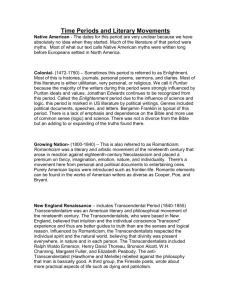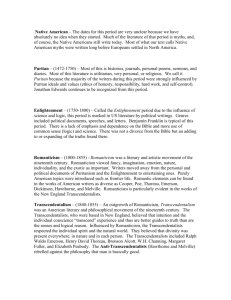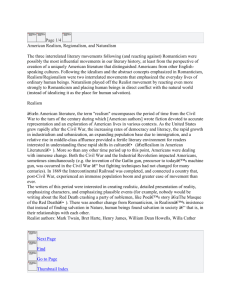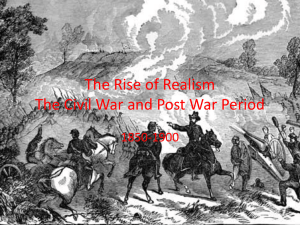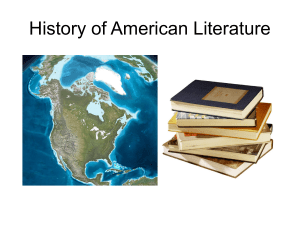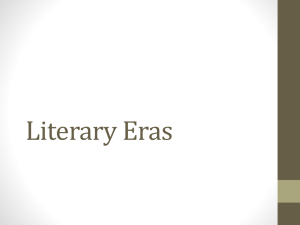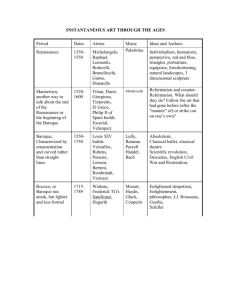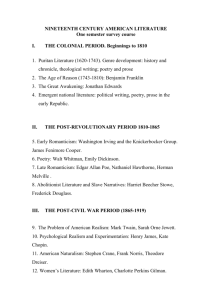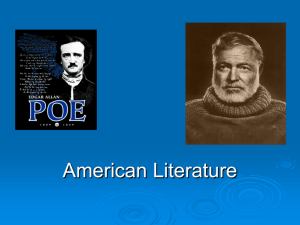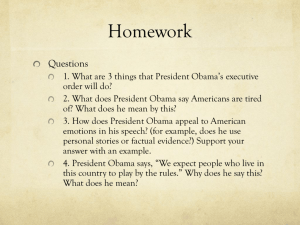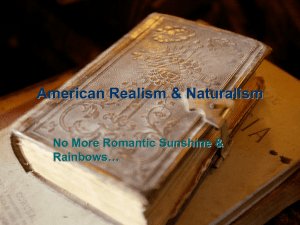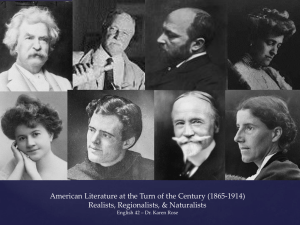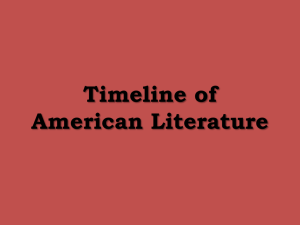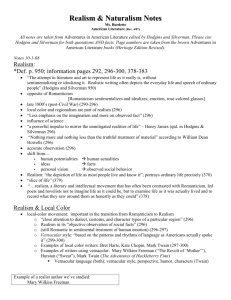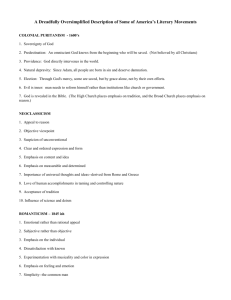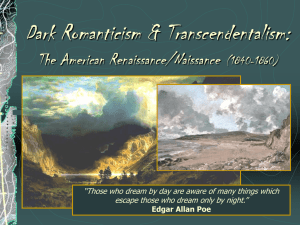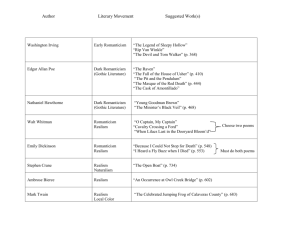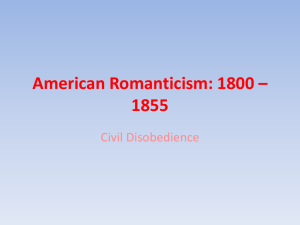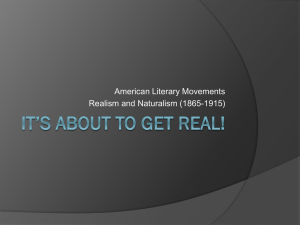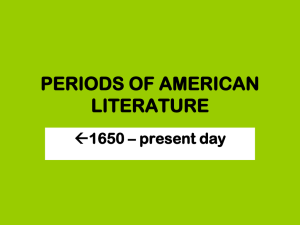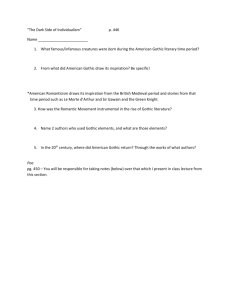Literary Time Periods- American Literature
advertisement
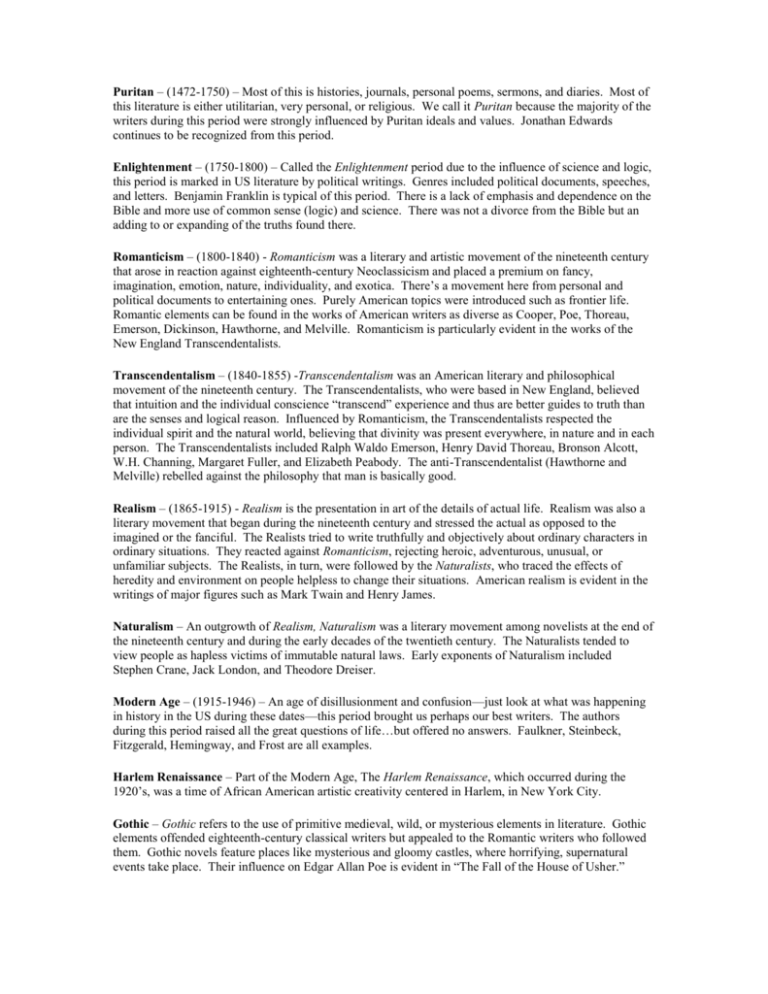
Puritan – (1472-1750) – Most of this is histories, journals, personal poems, sermons, and diaries. Most of this literature is either utilitarian, very personal, or religious. We call it Puritan because the majority of the writers during this period were strongly influenced by Puritan ideals and values. Jonathan Edwards continues to be recognized from this period. Enlightenment – (1750-1800) – Called the Enlightenment period due to the influence of science and logic, this period is marked in US literature by political writings. Genres included political documents, speeches, and letters. Benjamin Franklin is typical of this period. There is a lack of emphasis and dependence on the Bible and more use of common sense (logic) and science. There was not a divorce from the Bible but an adding to or expanding of the truths found there. Romanticism – (1800-1840) - Romanticism was a literary and artistic movement of the nineteenth century that arose in reaction against eighteenth-century Neoclassicism and placed a premium on fancy, imagination, emotion, nature, individuality, and exotica. There’s a movement here from personal and political documents to entertaining ones. Purely American topics were introduced such as frontier life. Romantic elements can be found in the works of American writers as diverse as Cooper, Poe, Thoreau, Emerson, Dickinson, Hawthorne, and Melville. Romanticism is particularly evident in the works of the New England Transcendentalists. Transcendentalism – (1840-1855) -Transcendentalism was an American literary and philosophical movement of the nineteenth century. The Transcendentalists, who were based in New England, believed that intuition and the individual conscience “transcend” experience and thus are better guides to truth than are the senses and logical reason. Influenced by Romanticism, the Transcendentalists respected the individual spirit and the natural world, believing that divinity was present everywhere, in nature and in each person. The Transcendentalists included Ralph Waldo Emerson, Henry David Thoreau, Bronson Alcott, W.H. Channing, Margaret Fuller, and Elizabeth Peabody. The anti-Transcendentalist (Hawthorne and Melville) rebelled against the philosophy that man is basically good. Realism – (1865-1915) - Realism is the presentation in art of the details of actual life. Realism was also a literary movement that began during the nineteenth century and stressed the actual as opposed to the imagined or the fanciful. The Realists tried to write truthfully and objectively about ordinary characters in ordinary situations. They reacted against Romanticism, rejecting heroic, adventurous, unusual, or unfamiliar subjects. The Realists, in turn, were followed by the Naturalists, who traced the effects of heredity and environment on people helpless to change their situations. American realism is evident in the writings of major figures such as Mark Twain and Henry James. Naturalism – An outgrowth of Realism, Naturalism was a literary movement among novelists at the end of the nineteenth century and during the early decades of the twentieth century. The Naturalists tended to view people as hapless victims of immutable natural laws. Early exponents of Naturalism included Stephen Crane, Jack London, and Theodore Dreiser. Modern Age – (1915-1946) – An age of disillusionment and confusion—just look at what was happening in history in the US during these dates—this period brought us perhaps our best writers. The authors during this period raised all the great questions of life…but offered no answers. Faulkner, Steinbeck, Fitzgerald, Hemingway, and Frost are all examples. Harlem Renaissance – Part of the Modern Age, The Harlem Renaissance, which occurred during the 1920’s, was a time of African American artistic creativity centered in Harlem, in New York City. Gothic – Gothic refers to the use of primitive medieval, wild, or mysterious elements in literature. Gothic elements offended eighteenth-century classical writers but appealed to the Romantic writers who followed them. Gothic novels feature places like mysterious and gloomy castles, where horrifying, supernatural events take place. Their influence on Edgar Allan Poe is evident in “The Fall of the House of Usher.”
